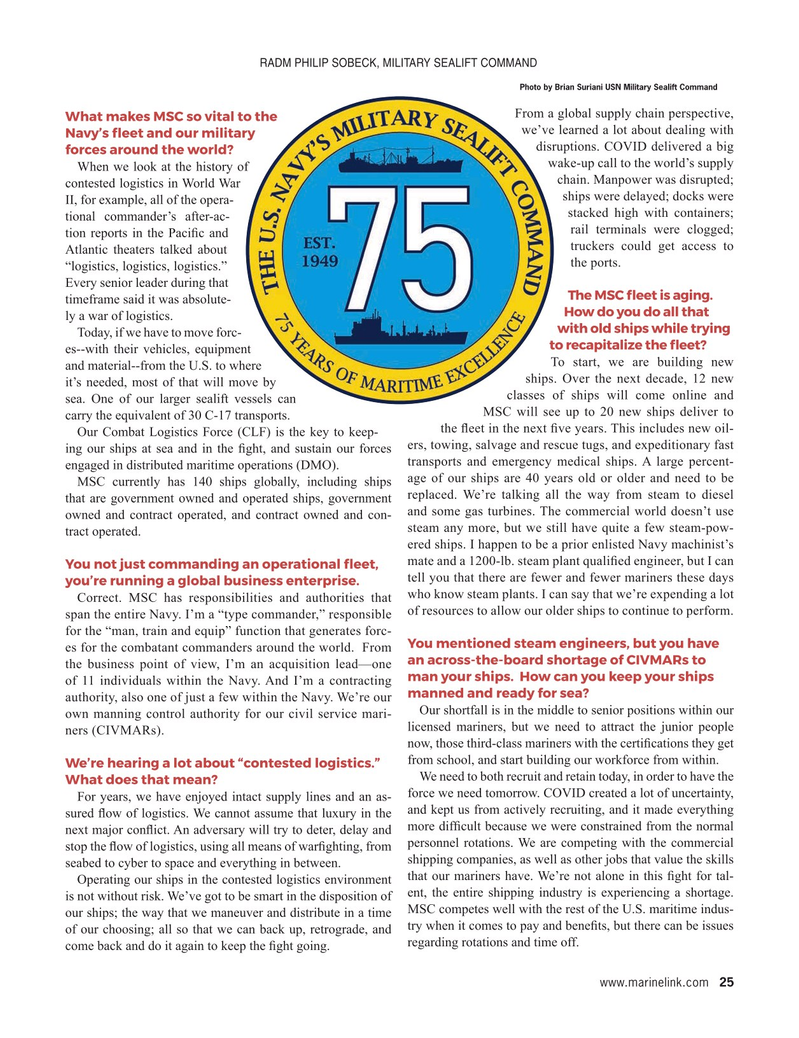
Page 25: of Maritime Reporter Magazine (April 2024)
Read this page in Pdf, Flash or Html5 edition of April 2024 Maritime Reporter Magazine
RADM PHILIP SOBECK, MILITARY SEALIFT COMMAND
Photo by Brian Suriani USN Military Sealift Command
From a global supply chain perspective,
What makes MSC so vital to the we’ve learned a lot about dealing with
Navy’s ? eet and our military disruptions. COVID delivered a big forces around the world?
wake-up call to the world’s supply
When we look at the history of chain. Manpower was disrupted; contested logistics in World War ships were delayed; docks were
II, for example, all of the opera- stacked high with containers; tional commander’s after-ac- rail terminals were clogged; tion reports in the Paci? c and truckers could get access to
Atlantic theaters talked about the ports.
“logistics, logistics, logistics.”
Every senior leader during that
The MSC ? eet is aging. timeframe said it was absolute-
How do you do all that ly a war of logistics. with old ships while trying
Today, if we have to move forc- to recapitalize the ? eet?
es--with their vehicles, equipment
To start, we are building new and material--from the U.S. to where ships. Over the next decade, 12 new it’s needed, most of that will move by classes of ships will come online and sea. One of our larger sealift vessels can
MSC will see up to 20 new ships deliver to carry the equivalent of 30 C-17 transports.
the ? eet in the next ? ve years. This includes new oil-
Our Combat Logistics Force (CLF) is the key to keep- ing our ships at sea and in the ? ght, and sustain our forces ers, towing, salvage and rescue tugs, and expeditionary fast transports and emergency medical ships. A large percent- engaged in distributed maritime operations (DMO).
MSC currently has 140 ships globally, including ships age of our ships are 40 years old or older and need to be that are government owned and operated ships, government replaced. We’re talking all the way from steam to diesel and some gas turbines. The commercial world doesn’t use owned and contract operated, and contract owned and con- steam any more, but we still have quite a few steam-pow- tract operated.
ered ships. I happen to be a prior enlisted Navy machinist’s mate and a 1200-lb. steam plant quali? ed engineer, but I can
You not just commanding an operational ? eet, tell you that there are fewer and fewer mariners these days you’re running a global business enterprise.
Correct. MSC has responsibilities and authorities that who know steam plants. I can say that we’re expending a lot span the entire Navy. I’m a “type commander,” responsible of resources to allow our older ships to continue to perform.
for the “man, train and equip” function that generates forc- es for the combatant commanders around the world. From You mentioned steam engineers, but you have the business point of view, I’m an acquisition lead—one an across-the-board shortage of CIVMARs to of 11 individuals within the Navy. And I’m a contracting man your ships. How can you keep your ships authority, also one of just a few within the Navy. We’re our manned and ready for sea?
Our shortfall is in the middle to senior positions within our own manning control authority for our civil service mari- licensed mariners, but we need to attract the junior people ners (CIVMARs). now, those third-class mariners with the certi? cations they get from school, and start building our workforce from within.
We’re hearing a lot about “contested logistics.”
We need to both recruit and retain today, in order to have the
What does that mean?
force we need tomorrow. COVID created a lot of uncertainty,
For years, we have enjoyed intact supply lines and an as- sured ? ow of logistics. We cannot assume that luxury in the and kept us from actively recruiting, and it made everything next major con? ict. An adversary will try to deter, delay and more dif? cult because we were constrained from the normal personnel rotations. We are competing with the commercial stop the ? ow of logistics, using all means of war? ghting, from shipping companies, as well as other jobs that value the skills seabed to cyber to space and everything in between.
Operating our ships in the contested logistics environment that our mariners have. We’re not alone in this ? ght for tal- is not without risk. We’ve got to be smart in the disposition of ent, the entire shipping industry is experiencing a shortage. our ships; the way that we maneuver and distribute in a time MSC competes well with the rest of the U.S. maritime indus- of our choosing; all so that we can back up, retrograde, and try when it comes to pay and bene? ts, but there can be issues regarding rotations and time off.
come back and do it again to keep the ? ght going. www.marinelink.com 25
MR #4 (18-33).indd 25 4/5/2024 9:07:21 AM

 24
24

 26
26
